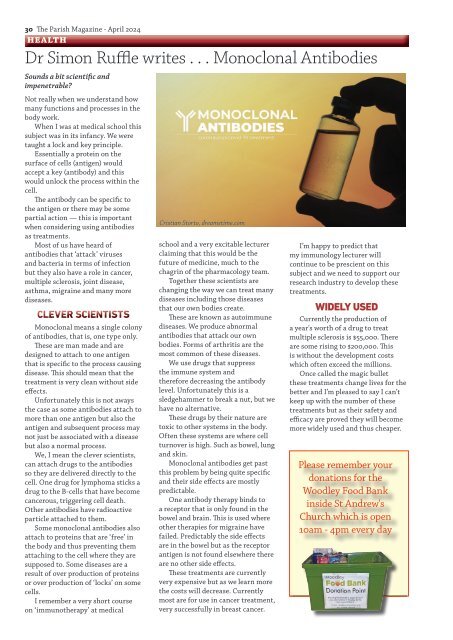The Parish Magazine April 2024
Serving the communities of Charvil, Sonning, and Sonning Eye since 1869
Serving the communities of Charvil, Sonning, and Sonning Eye since 1869
Create successful ePaper yourself
Turn your PDF publications into a flip-book with our unique Google optimized e-Paper software.
30 <strong>The</strong> <strong>Parish</strong> <strong>Magazine</strong> - <strong>April</strong> <strong>2024</strong><br />
HEALTH<br />
Dr Simon Ruffle writes . . . Monoclonal Antibodies<br />
Sounds a bit scientific and<br />
impenetrable?<br />
Not really when we understand how<br />
many functions and processes in the<br />
body work.<br />
When I was at medical school this<br />
subject was in its infancy. We were<br />
taught a lock and key principle.<br />
Essentially a protein on the<br />
surface of cells (antigen) would<br />
accept a key (antibody) and this<br />
would unlock the process within the<br />
cell.<br />
<strong>The</strong> antibody can be specific to<br />
the antigen or there may be some<br />
partial action — this is important<br />
when considering using antibodies<br />
as treatments.<br />
Most of us have heard of<br />
antibodies that ‘attack’ viruses<br />
and bacteria in terms of infection<br />
but they also have a role in cancer,<br />
multiple sclerosis, joint disease,<br />
asthma, migraine and many more<br />
diseases.<br />
CLEVER SCIENTISTS<br />
Monoclonal means a single colony<br />
of antibodies, that is, one type only.<br />
<strong>The</strong>se are man made and are<br />
designed to attach to one antigen<br />
that is specific to the process causing<br />
disease. This should mean that the<br />
treatment is very clean without side<br />
effects.<br />
Unfortunately this is not aways<br />
the case as some antibodies attach to<br />
more than one antigen but also the<br />
antigen and subsequent process may<br />
not just be associated with a disease<br />
but also a normal process.<br />
We, I mean the clever scientists,<br />
can attach drugs to the antibodies<br />
so they are delivered directly to the<br />
cell. One drug for lymphoma sticks a<br />
drug to the B-cells that have become<br />
cancerous, triggering cell death.<br />
Other antibodies have radioactive<br />
particle attached to them.<br />
Some monoclonal antibodies also<br />
attach to proteins that are ‘free’ in<br />
the body and thus preventing them<br />
attaching to the cell where they are<br />
supposed to. Some diseases are a<br />
result of over production of proteins<br />
or over production of ‘locks’ on some<br />
cells.<br />
I remember a very short course<br />
on ‘immunotherapy’ at medical<br />
Cristian Storto, dreamstime.com<br />
school and a very excitable lecturer<br />
claiming that this would be the<br />
future of medicine, much to the<br />
chagrin of the pharmacology team.<br />
Together these scientists are<br />
changing the way we can treat many<br />
diseases including those diseases<br />
that our own bodies create.<br />
<strong>The</strong>se are known as autoimmune<br />
diseases. We produce abnormal<br />
antibodies that attack our own<br />
bodies. Forms of arthritis are the<br />
most common of these diseases.<br />
We use drugs that suppress<br />
the immune system and<br />
therefore decreasing the antibody<br />
level. Unfortunately this is a<br />
sledgehammer to break a nut, but we<br />
have no alternative.<br />
<strong>The</strong>se drugs by their nature are<br />
toxic to other systems in the body.<br />
Often these systems are where cell<br />
turnover is high. Such as bowel, lung<br />
and skin.<br />
Monoclonal antibodies get past<br />
this problem by being quite specific<br />
and their side effects are mostly<br />
predictable.<br />
One antibody therapy binds to<br />
a receptor that is only found in the<br />
bowel and brain. This is used where<br />
other therapies for migraine have<br />
failed. Predictably the side effects<br />
are in the bowel but as the receptor<br />
antigen is not found elsewhere there<br />
are no other side effects.<br />
<strong>The</strong>se treatments are currently<br />
very expensive but as we learn more<br />
the costs will decrease. Currently<br />
most are for use in cancer treatment,<br />
very successfully in breast cancer.<br />
I’m happy to predict that<br />
my immunology lecturer will<br />
continue to be prescient on this<br />
subject and we need to support our<br />
research industry to develop these<br />
treatments.<br />
WIDELY USED<br />
Currently the production of<br />
a year's worth of a drug to treat<br />
multiple sclerosis is $55,000. <strong>The</strong>re<br />
are some rising to $200,000. This<br />
is without the development costs<br />
which often exceed the millions.<br />
Once called the magic bullet<br />
these treatments change lives for the<br />
better and I’m pleased to say I can’t<br />
keep up with the number of these<br />
treatments but as their safety and<br />
efficacy are proved they will become<br />
more widely used and thus cheaper.<br />
Please remember your<br />
donations for the<br />
Woodley Food Bank<br />
Please inside remember St Andrew's your<br />
Church which is open<br />
10am - 4pm every day<br />
donations for the Woodley Food<br />
Bank and place them in the box<br />
just inside St Andrew's Church.<br />
Thank you!

















